Supermarket Man
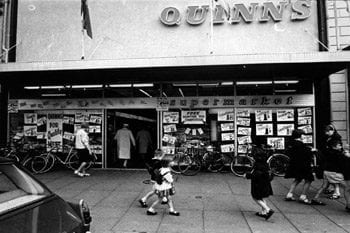
His was a chain of only 24 shops operating in a country with only four million people, but under his tenure it ranked number 20 in the world for sales per square foot and inspired the heads of international retail giants
11 March 2009
In Dundalk in April 1961, a retired schoolteacher is leaving her local supermarket, laden down with groceries.
On his way home too, the buoyant young store owner, barely out of college, approaches and offers to drive her home in his brand new motorcar.
Carrying her messages into her house, there on the piano he catches sight of one of the store’s own shopping baskets, upside-down and cradling a bunch of flowers.
“There’s that basket you insisted on me taking on the first day you opened last year,” she beams. Of course, the young Feargal Quinn would never dream of telling her she wasn’t supposed to take it home.
Supermarket man
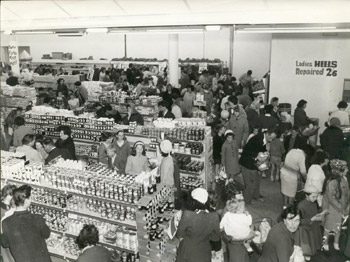 When you think of supermarkets in Ireland, he is the person you automatically think of. Not just because he presided over the most successful chain of Irish supermarkets during his 45-year retail career, nor because he is now the most well known and widely respected ambassador of the Irish grocery trade. You think of Feargal Quinn because he is a man of firsts, who through his own simple but unique vision transformed his business, and consequently the supermarket industry in Ireland, in every decade from the 1960s to the present.
When you think of supermarkets in Ireland, he is the person you automatically think of. Not just because he presided over the most successful chain of Irish supermarkets during his 45-year retail career, nor because he is now the most well known and widely respected ambassador of the Irish grocery trade. You think of Feargal Quinn because he is a man of firsts, who through his own simple but unique vision transformed his business, and consequently the supermarket industry in Ireland, in every decade from the 1960s to the present.
Although he hung up his white coat in 2005, Quinn has remained deeply involved with the grocery trade, both in Ireland and internationally. Currently, he is a director on the board of the Paris-based CIES (Global Food Business Forum), a director on the board of the US Food Marketing Institute, and chairman of EuroCommerce, the representative to the EU for retail, wholesale and international trade.
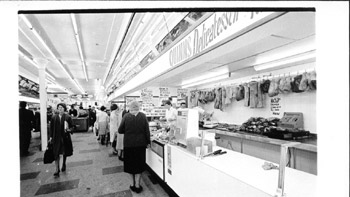 In Ireland, as an independent member of the Seanad, Quinn is a member of the Forum on Europe and sits on the Oireachtas finance committee and the European Affairs committee. Makes me wonder at his understanding of the word ‘retirement’.
In Ireland, as an independent member of the Seanad, Quinn is a member of the Forum on Europe and sits on the Oireachtas finance committee and the European Affairs committee. Makes me wonder at his understanding of the word ‘retirement’.
“I was too busy to get bored,” he laughs, as we lunch in Leinster House with his assistant Anne. With his extensive experience and in his capacity as a senator, Quinn has advised on matters relating to the sector, including the An Bord Bia (Amendment) Bill 2003. At the time he urged to keep Bord Bia and Bord Glas separate.
“My argument was that, for the future, the added value and the creation of jobs was much more likely to come from 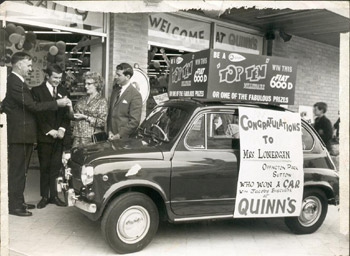 food than from agriculture,” he says. By that logic, Quinn advised that Irish food business should be unequivocally divided from the Department of Agriculture and its agenda. “I didn’t get my way, but at the time my minority report attracted more attention.”
food than from agriculture,” he says. By that logic, Quinn advised that Irish food business should be unequivocally divided from the Department of Agriculture and its agenda. “I didn’t get my way, but at the time my minority report attracted more attention.”
Controversial
Quinn’s view may be seen as controversial but given the current state of the grocery market, it’s likely to be shared by many others. In his view, retailers today should be unafraid to harness more value for their customers from outside the State. If you can get a “more suitable” product elsewhere (especially one that offers value for money), then why not freely provide that choice for Irish consumers if it’s what they demand?
Putting this in context of the recent Oireachtas meeting with retailers, which Quinn attended, the issue of sourcing outside Ireland becomes even more pointed. “I raised this last week (at the meeting). The retailers were in and I was listening to them saying: “We the retailers are getting the blame for high prices but, in fact, we have to pay much higher prices, even for Irish products which are produced in Ireland, and that we can buy cheaper in Glasgow.”
Considering particularly the certain suppliers that were named during the session, including McVities and Pampers, he says: “These are products that, whether it’s Irish suppliers or just the Irish distribution system, appear to carry prices that are way out of line.”
“It’ll be interesting to see if the suppliers will be able to give some credibility to this,” says Quinn, referring to the much-awaited Oireachtas meeting that was yet to take place. Particularly for those that were named, Pampers and McVities, he looks forward to hearing them explain “why is it so much dearer here?” Especially, when their products are offered to retailers in Belfast for considerably less.
However, unwilling to take sides entirely before all the facts are before us, he acknowledges that the Irish price problem is more complex than simply blaming one side or the other: “It really is very difficult to explain why something in Newry is so much cheaper than something in Dundalk.”
It is a problem with which Quinn is very familiar, given he opened his first shop in the town some 49 years ago. However, this is also the reason he believes “Dundalk is very resilient” and used to a tougher life on account of the unique competitive environment. He has seen the traffic go the other way too, and knows it will again. Indeed he has probably seen most things before.
Customer is still king
There is no doubt though that we are in tough times now, with a double offensive from the weak sterling and the general economic decline in Ireland. Does Quinn still believe in crowning the customer in these bargain-hunting times? Prioritising customer service over profit when loyalty seems far from the customer’s mind?
“In the long-term approach it is true. You can have a drop in profit, you could even have a negative, for a quarter or a year, or two. But if you lose your customers, even if you make a profit that year, it’s highly unlikely you’ll last,” he answers.
Still, I ask, can retailers afford to have faith in customer loyalty anymore? After the experience of the boom years and the way they altered the market and customer behaviour? Not to mention the fact that competition in the market has intensified to such a degree, and that it has reached near saturation in the supermarket sector?
“I think competition in the 60s was fiercer. I think competition in the 70s was just as fierce,” Quinn responds without hesitation. “I remember the year particularly, 1970 to 1971, and competition was fierce. There were a lot of companies going out of business and a lot of names disappeared off the scene.”
At the time Quinn’s Supermarket opened in Dundalk in 1960, the UK chain Liptons had around 60 stores in Ireland. “They were one of the biggest chains here; they were gone by 1970,” he says. “Tesco came to Ireland in 1976 and was gone within two years. They had 24 shops but they weren’t able to succeed here then,” he says. The UK retailer took a stake in Welsh businessman Albert Gubay’s discount chain, 3 Guys, which was eventually bought out by H Williams in 1986. “People say business is tough now?”
Price war and peace
Perhaps it is true, with all the media hype today we forget that the UK and Ireland have seen fierce times before. An era of great price wars and bitter contest that sent many companies to the wall, including H Williams the same year it bought up the discounter 3 Guys. And let’s not forget, that was hardly boom time either. The key to success in such conditions could surely only be a strong stomach and an even stronger grip on the supply chain.
“Those who survived were the ones that were able to give their customers value in some form,” says Quinn. And sometimes, that meant at all costs too. “The prices were so much lower in our operation, I was a great believer in selling below cost.”
And this he did. In the 1960s Quinn went head to head with rival supermarket McCourt’s in Dundalk. “I think cornflakes normally sold for one and 11 pence for a large pack, and it was costing us about one and seven-pence. Then John McCourt and myself ended up in a price war and it came down to one and 10 pence, once and eight pence, one and seven pence, and eventually, one and six. We were selling below cost.”
The two continued to drop the price until McCourt’s was at one and three pence for a box of cornflakes and Quinn’s Supermarket was at one and four pence. At this point he decided it couldn’t go on. “I then put a sign in the window saying that we were willing to buy cornflakes for one and six pence. So customers could have gone down to him and bought a box for one and three, then brought them up and sold them to us for three pence profit. And it was still cheaper for us than buying from Kellogg’s.”
Needless to say, customers were only too happy to oblige. Even the man who sold the newspapers outside the door seized the opportunity, relieving Quinn’s rival of a case of two dozen boxes. Realising his ploy, store employees stamped the boxes all over with the name ‘John McCourt,’ “Because what was I going to with 24 boxes stamped with his name?” says Quinn. “So I put them in the boot of my car and took them down to Red Island, my father’s holiday camp, and substituted 24 packets from his kitchen. So I lost out on nothing,” he laughs. So concluded the cornflake war.
However, business is business and Quinn assures there was no personal animosity between himself and his rival: “I was very careful to tell John McCourt what I was doing. People thought we were enemies. After about two weeks the parish priest came down to see me, thinking he could he act as a go-between for these two nasty retailers! But we were actually getting on very well. Both of us were doing so well out of it. It was Drogheda, Dunleer, Ardee and Newry that were suffering.
“By this time, both the Dundalk Argos and the Dundalk Democrat had the story of this price war, and the whole of County Louth was now shopping in Dundalk. People in Ardee, people in Dunleer, people in Drogheda were now coming to Dundalk. It was huge publicity for the town.”
The challenge of change
It was not tough times like these that were hardest to overcome for Quinn however, but rather the more subtle challenges of adapting in five different decades. “I would say the biggest challenge over the years was making sure we were responding to customers’ changing needs, and I mean changing needs because what customers wanted in 1960 was not what they wanted in 1970. And it was a very subtle change. By the 1980s it was changing again, and again by the 1990s.
“I think to be willing to respond even to one customer, to say, “I don’t want to lose that customer”, even if their needs seem to be in the minority, and to approach it on that basis, was the only way to succeed. It was the biggest challenge that all of us faced because things changed so quickly in those days.”
Quinn takes the example of when he first went into internet shopping, circa 1991. “We thought we had done everything correctly but we found there were customers that said, “I love the idea of internet shopping but I don’t like that you only give me a two hour gap, delivering between 4 and 6 o’clock.
“We couldn’t find a way to overcome it because we couldn’t guarantee a way to be there exactly at 6.15. So we came up with ‘click and collect’, where you do the ordering, we do the shopping and then store if for you, in frozen, chilled and ambient. Then you drive down and collect it because you know that you’re coming back from work at 5.30, and you don’t want to sit there waiting on deliveries between 6pm and 8pm.
“So we do the shopping for you but we don’t do the delivering. Now that didn’t seem to make sense when we first started with internet shopping, we wouldn’t have thought of that, but ‘click and collect’ was very suitable for some customers. It’s an example of something that could be adjusted.”
Throwing boomerangs
In his book Crowning the Customer, Quinn discusses the ‘boomerang principle’, which centres on true customer-focused retailing, or capturing long-term business from each customer by bringing them back rather than attempting to maximise sales from them in a single visit. This entails really listening to what the customer wants, and taking time to listen regularly.
It also means doing things your accountant will tell you do not make good business sense, like removing confectionary from the point of sale area so that parents with children can pay for their shopping in peace. Or introducing playhouses to keep children out of the way entirely. These were bold decisions because while the cost of implementing them was entirely obvious, the benefits were not quantifiable. However, following his instincts and foregoing the short-term pay-off resulted in something ultimately more valuable, long-term customer loyalty. His success at achieving this has made him one of the most sought-after speakers on the international lecture circuit, and his book has recently been translated into its 14th language.
Quinn wrote: “You sometimes need considerable courage to take the unquantifiable option. This is where leadership comes in.” As leader in his company, Quinn was not afraid to be confronted by complaints, nor to follow the requests of the minority, nor to follow his own instincts. As a leader today, he tells us not to be afraid to follow his example.



 Print
Print
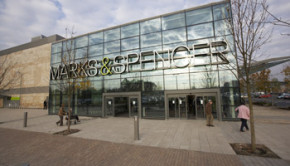





Fans 0
Followers